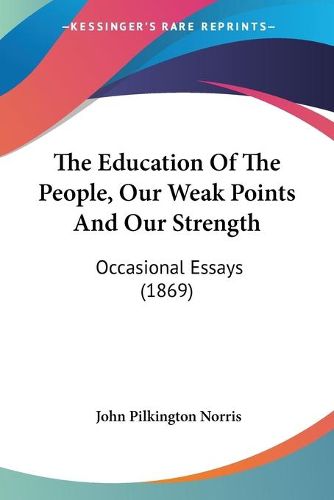Readings Newsletter
Become a Readings Member to make your shopping experience even easier.
Sign in or sign up for free!
You’re not far away from qualifying for FREE standard shipping within Australia
You’ve qualified for FREE standard shipping within Australia
The cart is loading…






General Books publication date: 2009 Original publication date: 1869 Original Publisher: Laurie Subjects: Education Educational law and legislation Child labor Women Working class Middle class Notes: This is a black and white OCR reprint of the original. It has no illustrations and there may be typos or missing text. When you buy the General Books edition of this book you get free trial access to Million-Books.com where you can select from more than a million books for free. Excerpt: CHAPTER III. Need Of One Simple Law For The Regulation Of Children’s Labour. The further extension of the educational principle of the Factory Acts, advocated in the last chapter, forces upon us the question whether we should not do more wisely to extend it at once to all hired service of children in manufactures, or in agriculture, or in domestic service; and so give universality to the principle of making some amount of education a condition of children’s employment. For many years thoughtful people have seen that sooner or later this question must be raised and seriously answered by the nation one way or another, for until it be answered all other educational questions must be thereby embarrassed. Raised it was, prematurely perhaps, by Mr Adderley’s Bill in 1860: answered it has not been. That Bill was rejected chiefly because of the state of the public business at the period of the session to which its second reading had been postponed, and also because honourable members wished for more time to consider the subject. Mr Gladstone, Sir James Graham, Sir George Lewis, and others who opposed the second reading, expressly said that they by no means wished to be understood to negative its principle. That the problem is a very difficult one may be at once admitted. It involves some of the most vexed questions of political philosophy, leading up to that fundamental controversywhich has divided political thinkers in all ages –
What are the functions of the State 1 What…
$9.00 standard shipping within Australia
FREE standard shipping within Australia for orders over $100.00
Express & International shipping calculated at checkout
General Books publication date: 2009 Original publication date: 1869 Original Publisher: Laurie Subjects: Education Educational law and legislation Child labor Women Working class Middle class Notes: This is a black and white OCR reprint of the original. It has no illustrations and there may be typos or missing text. When you buy the General Books edition of this book you get free trial access to Million-Books.com where you can select from more than a million books for free. Excerpt: CHAPTER III. Need Of One Simple Law For The Regulation Of Children’s Labour. The further extension of the educational principle of the Factory Acts, advocated in the last chapter, forces upon us the question whether we should not do more wisely to extend it at once to all hired service of children in manufactures, or in agriculture, or in domestic service; and so give universality to the principle of making some amount of education a condition of children’s employment. For many years thoughtful people have seen that sooner or later this question must be raised and seriously answered by the nation one way or another, for until it be answered all other educational questions must be thereby embarrassed. Raised it was, prematurely perhaps, by Mr Adderley’s Bill in 1860: answered it has not been. That Bill was rejected chiefly because of the state of the public business at the period of the session to which its second reading had been postponed, and also because honourable members wished for more time to consider the subject. Mr Gladstone, Sir James Graham, Sir George Lewis, and others who opposed the second reading, expressly said that they by no means wished to be understood to negative its principle. That the problem is a very difficult one may be at once admitted. It involves some of the most vexed questions of political philosophy, leading up to that fundamental controversywhich has divided political thinkers in all ages –
What are the functions of the State 1 What…